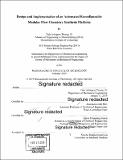Design and implementation of an automated reconfigurable modular flow chemistry synthesis platform
Author(s)
Thomas, Dale Arlington,III.
Download1102316371-MIT.pdf (23.55Mb)
Other Contributors
Massachusetts Institute of Technology. Department of Mechanical Engineering.
Advisor
Anastasios John Hart.
Terms of use
Metadata
Show full item recordAbstract
Synthetic chemistry has been the driving force behind advances in pharmaceuticals, agricultural chemicals to advanced materials; however, these fields have struggled with a slow pace of discovery, limited reproducibility, and difficulty scaling promising new molecules. Current organic chemistry labs rely on batch methodologies limiting the safe process windows, contributing to scaling difficulties, and causing reproducibility issues. Advances in laboratory automation and flow chemistry can be combined to address this bottleneck while increasing expert chemists' productivity. Automated reaction platforms, however, have been limited in their ability to access a diverse set of process units, beyond simple mixing and stirring. A system capable of carrying out multi-step syntheses, inline reaction monitoring, multi-phase reactions, and is easily reconfigurable could enable access to novel process windows and enhance laboratory productivity. In this work, the development of a reconfigurable continuous flow chemistry platform capable of multistep syntheses is undertaken. This system is capable of interfacing with a library of process modules capable of handling solids, aggressive reagents, inline separations, and reaction conditions required for organic synthesis. These modules can be reconfigured and connected into the required sequence for target molecule synthesis. With reagents being routed to the process modules through the physical wiring of the connections to the assembled process modules eliminating complex valving manifolds. The assembly of the system is coordinated through graphical user interfaces (GUI) which executes a user generated recipe. The platform has been used to rapidly synthesize a variety of active pharmaceutical ingredients (API) and dyes requiring stereo-selectivity, site-selectivity, library generation, and convergent synthesis. This integrated reconfigurable flow chemistry platform aims to decrease the time required for synthesizing new molecules while increasing synthetic repeatability and lab-to-lab transferability. Automation of synthetic chemistry can decrease the time for molecule development and allow chemists to focus on pathway refinement, reaction optimization, and process analytics. This work required the incorporation of design concepts from microfluidics, robotics, and precision machine design into an integrated modular system for continuous end-to-end production of molecules.
Description
Thesis: Ph. D., Massachusetts Institute of Technology, Department of Mechanical Engineering, 2019 Cataloged from PDF version of thesis. Includes bibliographical references (pages 115-124).
Date issued
2019Department
Massachusetts Institute of Technology. Department of Mechanical EngineeringPublisher
Massachusetts Institute of Technology
Keywords
Mechanical Engineering.